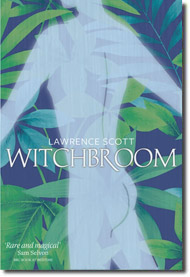|
|
| Home | Books | Biography | Critical Essays |
| Bibliography | TV and Radio | Previous Engagements | Archive | Contacts |
|
|
 |
|||||||
 |
|||||||
|
|||||||
Photograph - William Hearle |
||
 |
Witchbroom, Caribbean Classic "What a powerful writer…. A Caribbean One Hundred Years of Solitude." "Why was this book overlooked?" - Salman Rushdie "Rare and magical. The first of its kind… wonderful evocative language; complete emotional range; a loving, touching insight into human and family relationships. A Caribbean Creole family saga as told by its last surviving member, a hermaphrodite whose memory and imagination uncover multi-layered encounters, from the colonial birth of the New World to the 20th century, The novel – fantastical, sensuous and enchanting – is a sumptuous reckoning of the nightmares and passions of Caribbean history amid the "hysteria of parrots" and the witchbroom parasite that kills the family’s cocoa plantations. "I knew that no words here would have been possible without the poetry, prose, history, painting, sculpture, the mobility of mas, the invention of pan, calypso and the spoken voice which had come out of the yard of this archipelago, and which invaded my ears, sitting on the sill of the Demerara window.” Lavren, the narrator of Witchbroom. |
|||||
Papillote Press celebrates the 25th anniversary of the publication of Witchbroom Reviews & Endorsements See references to the most recent work on Witchbroom and related work on multidimensional queerness by Bastien Bomans, PhD student at the University of Liège, CEREP (Postcolonial Research Centre; https://www.cerep.uliege.be/cms/c_4435147/en/cerep-about-cerep). Bomans, Bastien. 26/10/2018. "'Cric, Crac, Queer': "Re-membering Silenced Stories of Oppression in Lawrence Scott’s Witchbroom (1992), Shani Mootoo’s Cereus Blooms at Night (1996) and David Chariandy’s Brother (2017)". Paper presented at the Our (Queer) Caribbean Symposium, London (England). (Web: http://hdl.handle.net/2268/245086). Bomans, Bastien. 08/12/2020. "‘Queerly postcolonial, postcolonially queer’: Aux croisements des oppressions dans l’œuvre littéraire. Cas de la littérature Trinidadienne". Paper presented at the Midis de la Recherche de Tradital, University of Brussels (Belgium). (Web: http://hdl.handle.net/2268/255586). "Rare and magical. The first of its kind… wonderful evocative language; complete emotional range; a loving, touching insight into human and family relationships." Sam Selvon "An impressively written work by a very gifted writer...subtle but compelling...strange and intriguing fiction with its layers of incurable pathos." Wilson Harris (Wasafiri) “What a powerful writer unfashionably leisured and completely self-confident. A Caribbean One Hundred Years of Solitude." Fay Weldon “An engrossing and compulsive work of fiction...with a sensuous prose style...a vast gallery of characters – vivid, grotesque, miraculous, surprising, pathetic." Ken Ramchand "This novel has more of the tone and texture and taste of the Caribbean milieu than any novel I can think of. This is a wonderful novel: rich, sensuous, quirky, energetic, vividly memorable." Stewart Brown “Witchbroom is more ambitious than anything I’ve seen in West Indian fiction. Witchbroom is a superbly crafted first novel.” Curdella Forbes (Journal of West Indian Literature) "The novel’s brilliance lends itself to the kind of superlatives that have come from a cross section of reviewers...he explores a colonial reality that has not been really dealt with in Caribbean literature... a picture of Trinidadian and Caribbean society that is unique, one that helps us to understand the present even better." Kwame Dawes (A Genuine Caribbean Text, Journal of Caribbean Literatures) “Witchbroom is a brilliantly complex and yet entertaining novel which combines poetry, humour and emotional depth. Scott’s epic story of Trinidad through the centuries enacts a nuanced negotiation of individual and national narratives, offering readers insight into the relationship between the island’s past, present and future.” Lucy Evans, University of Leicester "...an admirable fresco teeming with life, in which the personal mix with the historical in the narrator’s memory and imagination. With the publication of this novel, it seems that the white artist is at last prepared to acknowledge the planter’s responsibility in the creation of a society built on exploitation and oppression and that he considers himself an integral part of the society." Hena-Maes Jelinek "The novelist’s compelling achievement is in reviving the lives of the conquistadors...to re-examine the official history of the Caribbean and revise it so that it encompasses the lives of all those who have been left out of the mainstream: the Amerindians, the black slaves, the indentured servants as well as all women – the colonisers’ wives, mistresses and daughters." Dominique Dubois (In Search of a New Beginning for the New World in Witchbroom), Université Sorbonne Nouvelle "Cric?… Crac. Voices upon voices; tales upon tales, stories and history ascending and descending a family tree that gapes with an intriguing gap. The greed of planters… with the curse of the fungi on cocoa bushes as a recurring punctuation, and carnival not just a moment of release but an opening to lasting changes." Christine Pagnoulle, University of Liège "Witchbroom remains one of the masterworks of Caribbean literature. Scott has crafted a moving and complex allegory of the postcolonial Caribbean nation that traces the vagaries of memory, the power of the imagination, and the impossibility of Caribbean historiography." Njelle Hamilton, University of Virginia "Witchbroom is a dense, elaborate and beautifully wrought Caribbean family saga: sweeping in its scope and laden with sensory, emotional and historical detail. The novel’s lyrical style and time- travelling trickster-narrator, its magic, tenderness and romance, seduce readers into something very like an enchanted world. Yet that aura of enchantment ultimately serves Scott’s trenchant critique of colonialism and its malign effects." Rachel L Mordecai, University of Massachusetts Amherst The Amnesiac White Women of Witchbroom - jstor "The invention of Lavren as a shape-shifting, hermaphrodite storyteller and the extravagance of his Carnival tales may lighten the tone comparatively, but there is no doubting the loneliness and alienation that also run through this novel. Having embraced the hyperbole of Garcia Marquez and the long tales of Pierrot and Robberman to give form to his characters, Scott returns to a plainer style in the inserted ‘Journal’ to tell a more personal version of the same story." Patricia Murray Nation and Hybridity, Caribbean Literature After independence What you need to know Witchbroom is a visionary history of a Caribbean
Spanish/French Creole family and an island over
four centuries – to 20th-century independence.
With an innovative tone and content, its carnival
tales of crime and passion are told by the narrator
Lavren, who is both male and female. Links This book review section is Part One of a special cross-journal collaboration between sx salon and Anthu- rium. As two open-access Caribbean ... - R Cummings - Link
|
||